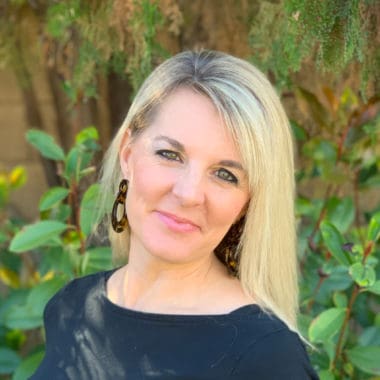I had the joy of attending the huge FOCUS (Fellowship of Catholic University Students) event, SLS20:“You Were Made for Mission” in Phoenix, Arizona December 30, 2019 – January 3, 2020. Almost 9000 college students, campus missionaries, priests, religious, and Catholics from all walks of life descended on downtown Phoenix for a week of profound prayer, inspiring talks, deeply reverent  Eucharistic adoration, Mass, discernment, and fellowship. Truly, it felt like a microcosm of all that is hopeful and good about the Church.
Eucharistic adoration, Mass, discernment, and fellowship. Truly, it felt like a microcosm of all that is hopeful and good about the Church.
Toward the end of the week, I had the chance to talk with Fr. Mike Schmitz, the director of Youth and Young Adult Ministry for the Diocese of Duluth and the chaplain for the Newman Center at the University of Minnesota-Duluth, whose popular programs and videos for Ascension Press inspire Catholics around the world.
He had some great insights into mission, discipleship—and the ultimate end of both of them, union with God.
There’s been a lot of talk in the Church lately about “discipleship” and it is so much of what you do, too, with young people, encouraging them to ‘drop their nets,’ follow Christ, encounter Him as a living person, and say ‘yes’ to His invitation. But the end, of course, isn’t discipleship, its union. And there is a whole life to be lived in between. What can we do, in this life, to grow in union with God above and beyond that initial yes?
Fr. Mike: That’s so important.
A couple of years ago I was walking with an engineering student on campus and he asked, “How do you think the year is going so far?” and I answered, “Really well.” He asked, “How do you measure that?” And I explained that my metric is the degree to which students begin taking personal responsibility for their spiritual lives. Not just coming to Mass or Bible study, but that they are showing up for personal prayer. Once you have learned how to pray, there is virtually nothing that can come up in your life that can take you away from the Lord.
If somebody knows how to pray, and they choose how to pray, and they say ‘yes’ to God’s grace and invitation to union, then they don’t have to worry. They might go to a parish that is barren in its offering or not have a young adult community, but they are going to be ok. It doesn’t mean they don’t need community, but that they can weather anything.
One of the things FOCUS reminds us of again and again is the union of discipleship with Divine Intimacy. Divine Intimacy is the paramount call to someone in discipleship.
How do you help a layperson begin to learn the art of prayer?
Fr. Mike: One of my friends has a saying, “Catholics are not taught to pray. They are taught how to repeat.” It is a good way to start—Jesus was taught the psalms, after all! But it is not enough. Not even all seminarians are taught how to pray. Fr. Jacques Philippe talks about how prayer can’t be merely a technique. If it is a technique, then there will be people who will be better at it or worse at it. Prayer is something other than method.
How do we teach it? Similarly to how discipleship happens: relationally. You can have classes and training but I really think that learning to do anything in the Christian life is going to be through relationship. Whether that is a priest in the parish, an experienced mom, or anybody with a depth of knowledge.
St. Francis Xavier is the patron of this conference because he is the patron of the missions. But there is another patroness of the missions.
Fr. Mike: Thérèse.
Yes! So why do we need both contemplation and action?
Fr. Mike: It’s all captured in the book, “The Soul of the Apostolate.” (By Jean-Baptiste Chautard, O.C.S.O.) There is such a thing as the “heresy of good works” where action without contemplation is “doomed to fruitlessness,” ultimately. When we have a conference where we are desiring that people encounter Christ, what we are hoping for nothing short of a miracle. We prepare best for each talk or conference by fasting, prayer, begging the Lord. So there is that sense that without St.Thérèse, without that depth of interiority and complete reliance on Jesus and his grace, what we are hoping for would be fruitless.
How would advise a young person—or anyone—today to find where their particular mission field is?
Fr. Mike: First of all, go back home and pray. The first mission field is your own heart. It will not be obvious and immediate, and even if it is, the work will not be explosive. It is most likely going to take a lot of time and be very difficult, and so we first have to cultivate that interior life.
Secondly, even if you don’t know where God is going to send you, you do know what he wants you to do: He wants you to deepen your relationship with him in prayer, he wants you to be converted and live a life of grace and virtue. A lot of times we use what we don’t know to put off doing what we do know. Start with what you know—things that are often less glamorous or captivating, but are essential.
Which means just begin where you are. Everything I find myself doing now is because I responded to an invitation. It’s rare that I set out to make something happen. When I got ordained, I went where the bishop wanted me to go and I did what my duties were in the place where I was planted. Gradually we began to record my homilies and things began to happen from there. Every other thing that has born fruit since then is because of faithfulness to the exact plot of land the Lord has placed me in. In other words, do what is in front of you!
For more about FOCUS, see here.
Photos from FOCUS, used with permission.




